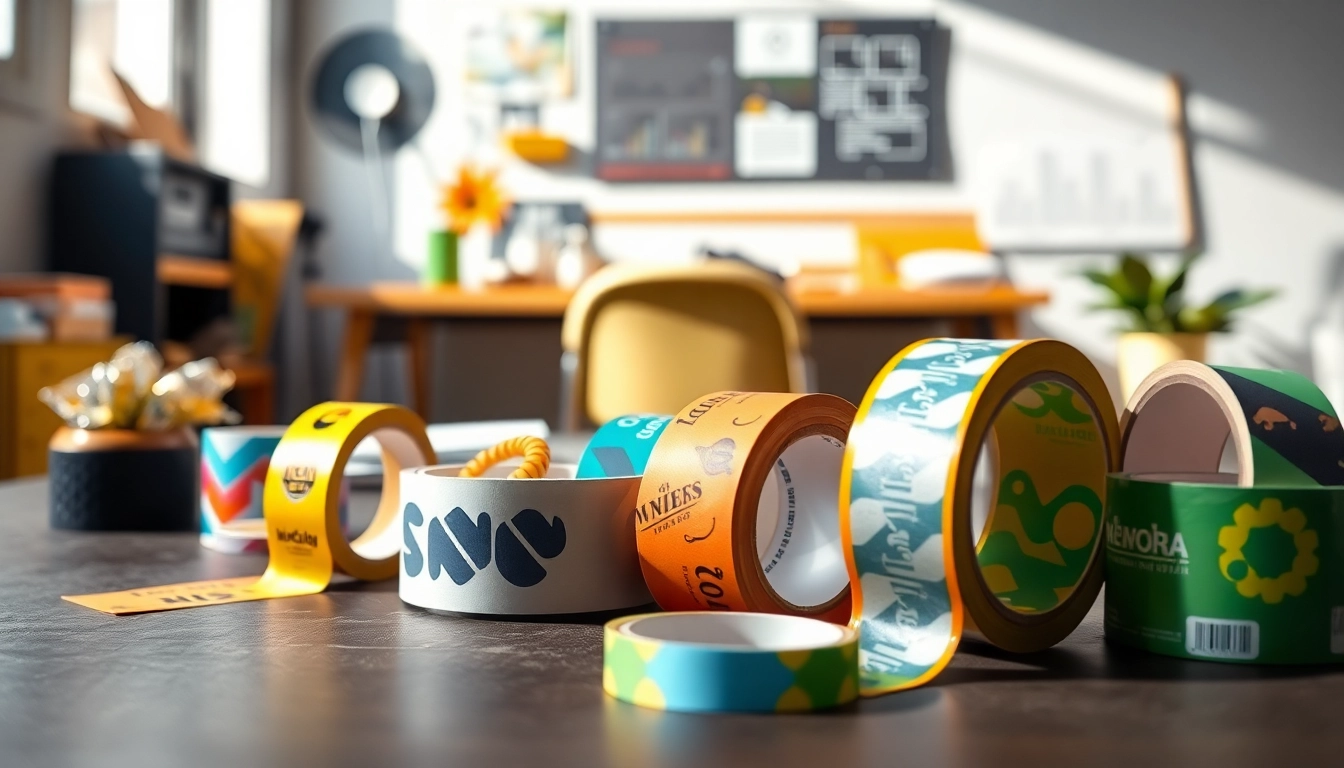Understanding Custom Tape: Types and Features
What is Custom Tape?
Custom tape is a versatile adhesive tape designed specifically to meet the unique needs of businesses and individuals. It serves both functional and branding purposes, making it an essential tool in various industries. Whether used for packaging, sealing, or promotional activities, custom tape provides a way to showcase a company’s branding while ensuring secure packaging solutions. Its adaptability allows users to choose different materials, lengths, widths, and adhesive levels to suit their specific requirements.
Different Types of Custom Tape
The world of custom tape is diverse, accommodating a variety of applications. Here are the most common types:
- Polypropylene Tape: Ideal for general purpose packaging, this type of tape is cost-effective and features strong adhesion, making it a popular choice for shipping and logistics.
- PVC Tape: Known for its durability, PVC tape is often used in industrial settings. It withstands extreme temperatures, making it suitable for cold conditions.
- Paper Tape: This eco-friendly option is used for light packaging, arts and crafts, and is even recyclable. It can be printed and customized for branding purposes.
- Foam Tape: Often utilized in mounting and soundproofing, foam tape is versatile and provides strong adhesion for various surfaces.
- Fabric Tape: Known for its flexibility, fabric tape is commonly used in fashion and crafting as it can easily be cut and shaped.
Key Features to Consider
When selecting custom tape, several features should influence your decision:
- Adhesive Quality: The type of adhesive can significantly impact performance. Ensure the adhesive is suitable for the materials being bonded.
- Durability: Depending on its intended use, consider the tape’s ability to withstand environmental stressors such as heat, moisture, and UV exposure.
- Printable Surface: If branding is a priority, choosing tape that allows for high-quality printing is essential. This ensures your designs remain vibrant.
- Size and Length: Custom tapes can be produced in various sizes. Determine the dimensions that best fit your applications.
- Recyclability: With increasing environmental awareness, opting for eco-friendly materials can enhance brand reputation and align with sustainability goals.
Creating Custom Tape: The Design Process
Choosing the Right Materials for Custom Tape
The material used in creating custom tape is foundational to its performance and appearance. Businesses must assess the primary attributes they require, such as adhesion strength and environmental resilience, before making a choice. Polypropylene is widely favored for its affordability and strength, while eco-conscious brands may prefer recycled paper materials.
Designing Your Custom Tape: Tips and Best Practices
Creating an impactful design for custom tape requires thoughtful consideration. Here are tips to guide the design process:
- Keep it Simple: Effective designs often feature minimal text and imagery. A clean aesthetic ensures legibility and brand visibility.
- Choose High-Contrast Colors: Utilizing contrasting colors enhances visibility, making it easier for consumers to recognize and remember your brand.
- Incorporate Logos Wisely: Ensure your logo is prominently displayed and fits seamlessly into the overall design to strengthen brand association.
- Test Different Designs: Conduct A/B testing with different designs to find which resonates best with your target audience.
Incorporating Branding into Your Design
Integrating branding into custom tape is crucial for creating brand recognition. It should reflect your company’s values and identity. Use your brand’s color palette, typography, and logos consistently across different media. This cohesiveness will help establish a strong brand presence and make your tape instantly recognizable.
Applications of Custom Tape: Beyond Packaging
Using Custom Tape for Marketing and Promotions
Custom tape serves as an excellent marketing tool, allowing businesses to promote their brand in both subtle and impactful ways. For instance, during product launches or events, brands can use tape to secure packaging while featuring promotional messages or offers. The tape acts as an extension of the marketing collateral, enhancing customer engagement.
Custom Tape in E-commerce: Enhancing Customer Experience
In the booming e-commerce industry, custom tape is critical for enhancing the unboxing experience. Customers are more likely to remember a brand positively when they receive a well-packaged product that includes branded seals or printed messages on the tape. This not only builds anticipation but also fosters loyalty among repeat customers.
Creative Uses for Custom Tape in Events and Gifts
Custom tape is also used creatively in various social contexts beyond commercial applications. Event planners often use it to brand items or create decorations that reflect the event’s theme. Whether for weddings, birthday parties, or corporate events, personalized tape adds a unique touch to gifts, invitations, or promotional materials, enhancing the overall experience.
Ordering and Manufacturing Custom Tape
Finding a Reliable Supplier for Custom Tape
Choosing the right supplier is critical when ordering custom tape. Look for manufacturers with a solid reputation and a history of producing quality products. Reviews, testimonials, and customer service responsiveness can provide insight into their reliability. Request samples to assess the quality before finalizing your order.
Understanding Pricing and Minimum Order Quantities
Pricing for custom tape can vary significantly based on materials, size, quantity, and printing options. Be mindful of minimum order quantities, as some suppliers may require a minimum purchase. It’s essential to perform a cost-benefit analysis to ensure the investment aligns with your marketing strategy while remaining within budget constraints.
Lead Times and Delivery Considerations
Lead times for manufacturing custom tape can vary, typically ranging from a few days to several weeks. Factors affecting lead time include the complexity of the design, the materials selected, and the manufacturer’s workload. Always inquire about estimated delivery dates during the ordering process to ensure your custom tape arrives when you need it.
Measuring the Impact of Custom Tape on Your Brand
Tracking Metrics: Customer Engagement and Brand Recognition
Measuring the effectiveness of your custom tape in enhancing brand recognition and customer engagement is imperative. Employ tracking mechanisms such as customer surveys or feedback forms to understand how the tape influenced their perception of your brand. Metrics such as repeat purchase rates and social media engagement can indicate the overall impact of your branding efforts.
Feedback and Adjustments: Improving Your Custom Tape Strategy
Actively seeking customer feedback on your custom tape aids in understanding its effectiveness. Use this input to refine your approach, adjusting design elements or materials used to better align with your audience’s preferences. Continuous improvement in your strategy will lead to enhanced brand perception and loyalty over time.
Long-term Benefits of Using Custom Tape in Marketing
The long-term benefits of integrating custom tape into your marketing strategy include enhanced brand visibility, improved customer loyalty, and a unique positioning in the market. As customers become more familiar with your packaging, they are more likely to associate positive experiences with your brand, leading to repeat business and referrals. Investing in quality custom tape is not just a cost; it is a strategic move towards sustainable growth.


